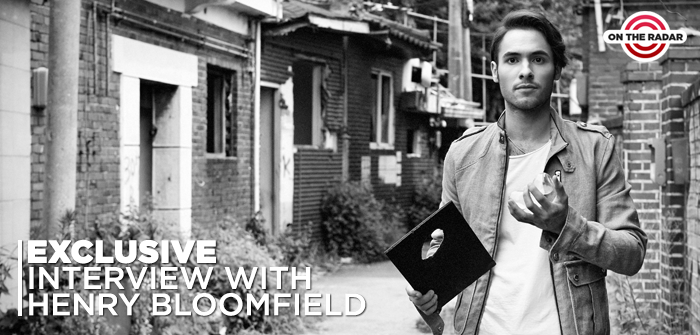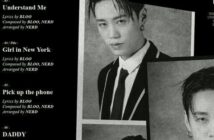Henry Bloomfield is quite the new phenomenon in the world of Korean music. His music is described in his own words as “energetic, rhythmic, and spunky,” and classes itself somewhere between K-pop and indie style music. In time with the release of his new song “Overtime”, Henry is here to talk music, breaking into the Korean market, and the differences between the Korean and American music scene.
A man of many talents. In addition to just singing, he also writes and arranges his own music, and he plays the piano. He grew up outside of Boston, Massachusetts, and attended Berklee College of Music till 2013, where he met some very interesting friends.
“ I attended a welcoming concert during my orientation at Berklee and sat a couple seats away from a Korean drummer named Sungtaek Oh,” Henry explains. “Soon after, I started a band with him and his two friends, Changmin Jun (bass) and Bumsuk Lee (saxophone). I was so impressed by their musical expertise and learned so much from their experienced advice. We gigged all around Boston and Cambridge and, before long, I was learning a lot about Korean culture and meeting my bandmates’ Korean friends.”
Now, the singer teaches english to support his music, and spends his free time shooting music videos and exploring the Korean culture. But how does one musician go from Berklee College to dropping everything and moving to Seoul in just one year? Well, his new friends turned out to be some very well connected…
“One of their buddies in particular, Hoon Choi, was a true musical mentor to me. Hoon is a well-known session bassist in Korea, having recorded and performed with the likes of Dynamic Duo, Clazziquai, and Brown Eyed Soul. After having such positive exposures to Korean musicians, their culture, and work ethic, I decided to move to Seoul to try to fully develop my music career.”
It is quite the leap for the young American born, both literally and figuratively speaking. It could be argued that south-east asian culture is as far from modern western as it gets, but Henry is not deterred. Even after two years he is still amazed and excited over living in Seoul, and it is clear he loves his new home to the point of questioning whether he will actually ever return home.
“Korea, Seoul in particular, is an amazingly exciting place to live in. Sometimes, I still get a rush of reality just realizing that yes, I’m actually living in Korea! When I look at a map and actually see how far away I am from my home in Massachusetts, I feel it,” he says and raves on about the food and the places to be. “I’m a huge fan of 비빔밥 (bibimbap) and 순두부찌개 (tofu stew). Korean food is so great because of the wide array of flavors that you can experience in one meal. I live in Sinsa, which is a part of Gangnam, and it’s a terrific place. There are a lot of places to eat, hang out, and enjoy with friends. Areas like Itaewon, Noksapyeong, Hongdae, and Hyehwa are also some of my favorites in Seoul. I think anyone visiting Korea would dig these spots!”
But there are challenges to uprooting so completely and starting over in an entirely new country. Especially one with a whole new alphabet, a new language and a whole new culture to learn.
“ Of course I experience language barriers – simply because I haven’t yet fully dedicated myself to the Korean language, and the natural difficulty of pursuing a career far away from home. In fact, I feel fortunate to have been treated very respectfully by almost everyone I’ve come in close contact with in Korea. If anything, given this kind treatment, I feel all the more responsible to make the most of my experience here and to succeed,“ Henry admits.
While his lyrics are largely english, Henry plays with languages and flips the style we’ve gotten used to seeing from K-pop and the korean music scene on its head. Instead of the, sometimes embarrassingly terrible english we all know and love from most Korean pop songs, Korean phrases are sprinkled throughout Henry’s lyrics, and are particularly noticeable in his choruses.
“Just as many K-pop tunes feature English hook lines throughout their tracks, I’m interested in employing the reverse-linguistic strategy in my own songs.”
The quality of his Korean compared to kpop groups’ English is certainly not something we are qualified to comment on, but it sounds right to us!
“ I’m a beginner but I am interested in trying to learn more, as quickly as possible. My friend Janett Kim was completely integral to the lyric translating process for Ms. Mary and Overtime,” Henry admits.
While the korean music scene is no stranger to new debuts and releases, Henry’s heritage and general new style has turned heads on the market. And with Korean music becoming increasingly popular across the world, he has even had reactions internationally.
“I write songs because I get supreme joy from creating them. That is, not just the melody, but the chords, the instrumentation, and the arrangement. Pursuing music in Korea is really exciting because, given the growing popularity of K-pop, the Korean market is more international than it has ever been,” He says.
Henry’s last two releases were done by major entertainment company CJ Entertainment, and uploaded to their channel on youtube. The channel is known within the k-pop community for uploading a wide variety of music videos, and is a popular place to find the latest releases. However, this creates an expectation of what exactly will be in their videos. Henry’s music and videos do not necessarily meet these expectations.
He is more fascinated than bothered by the attention: “When so many people experience my songs with this predisposition, it seems to create strong feelings, in both the positive and the negative, and I am equally driven by both. Many people are happy to hear something that is unquestionably different and unique, while some others are turned off for this very reason.”
Whether bothered or not, Henry’s debut and success has sparked comparisons to other westerners active in the Korean music market. In particular references to Chad Future, the youtube sensation who has made a name for himself in covering popular k-pop songs in English and has received a lot of hate from avid fans, claiming he is simply copying their favourite stars.
“To tell you the truth, and no offense at all towards Chad, I have become aware of him only through these types of comparisons. So, given that I’m unfamiliar with his tunes, style, and background, I think it’s safer to let other people make those observations. He seems to be interested and more knowledgable in the wide world of K-pop, while I am trying to create music that might not so obviously fit into one single genre all at once,” Henry says of the comparisons.
Before his move to Korea, the young musician spent a few months touring with American rapper Hoodie Allen around America. With experience from both markets, he has noted the key differences.
“Right off the bat, there is clearly a significant difference between the Korean and American music markets by virtue of the two countries’ respective sizes. America’s vastness has allowed for so many different artists to become successful in so many different genres,” he says. “On the other hand, my favorite part of the Korean music market is, the interconnectedness within it. I have met so many great musicians thanks to mutual friends, and it really feels like one doesn’t have to extend out too far before hooking up with talented Korean performers and writers. In my mind, this opens the floodgate doors in terms of opportunities for collaboration and networking. A musician’s dream.”
Henry is confident in his style and sound, and seems content to simply go where the world takes him. While he is currently happy in Korea, he is not opposed to returning and expanding to the western music market, should the opportunity arise. According to himself, he will take his music to those who want to listen, and, it seems, where it wants to go. Likewise, he supports the recent wave of Korean artists pushing towards the American market.
“I think any artist breaking into any market is great. It is a testament both to the artist’s versatility and to the given culture’s open mindedness. Who’s to say that an artist doesn’t have the right to have his or her music exposed in certain places? Music, by nature, is always borrowing from what has come before or what is happening at present, so I think it only makes sense to honor this truth by giving any type of music or artist a fair listen.”
On the topic of K-pop, we would be ashamed of our site name if we did not ask a few questions about his preferences on the korean pop music market.
“In terms of Korean artists, I’m currently very drawn towards the likes of Dynamic Duo, Primary, and Zion. T. I really dig their blend of hip hop, R&B, soul, and jazz. Their tunes are so smooth and hip. It would be a real thrill to collaborate with any of them,” he states. And with his recent success, who is to say it’s not to be in near future? We are sure whatever would come from the collaboration would blow our minds.
Finally, check out Henry Bloomfield’s special and personal message to UKP readers:
“I would like to thank you all so much for your interest and for supporting my music! It means so much to me. I hope that you feel the joy and life that I pour into it and that it can make you feel happy and GOOD. Be on the lookout for my new upcoming track, “Kiss a Gumiho,” and please get in touch with me whenever about anything and everything. Best wishes!”
Find his latest Music Video Overtime right here:




![[EXCLUSIVE] Interview With Kpop Girl Group Weki Meki](https://unitedkpop.com/wp-content/uploads/2020/03/WekiMeki_Header-214x140.jpg)
![[IDOL SPOTLIGHT] Introducing Weki Meki](https://unitedkpop.com/wp-content/uploads/2020/02/022420-Weki-Meki-Dazzle-Dazzle-Fantagio-1-214x140.jpg)